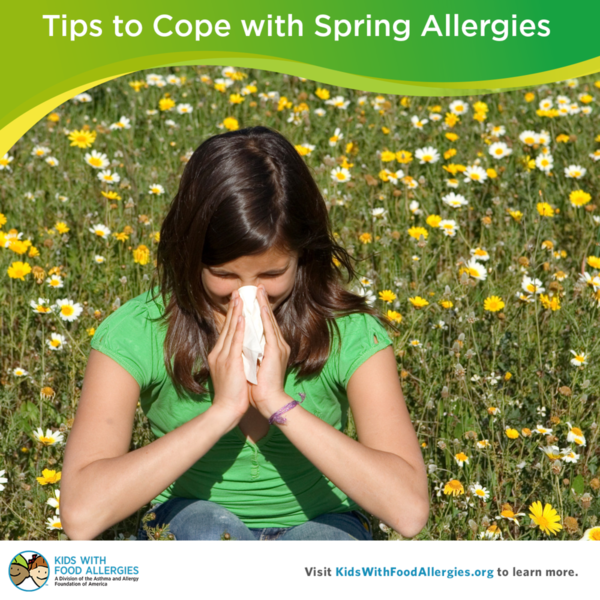Ah, spring – the return of crocuses, baseball, and, for some, itchy, watery eyes, congestion and other allergy symptoms. For some people, symptoms may be mild. For others, it may be severe enough to limit activities, interfere with sleep, or even trigger an asthma attack.
Weather patterns play a role in how severe your symptoms may be. “Dry, warm days are when pollen levels from trees, grasses, and weeds tend to be highest,” said David Stukus, MD, Chair of the Medical Advisory Team for Kids with Food Allergies. “Damp, rainy days are when mold spores peak. For people with allergies to both pollen and mold, they may not catch a break for months on end.”

According to reports, some parts of the country could see a worse-than-average season if the wet winter is followed by a warm spring.
And the American College of Allergy, Asthma, and Immunology said a mild winter might cause trees to bloom and pollinate early, which can prolong the spring pollen season.
Just as you must know what foods you are allergic to, it is helpful to know exactly which type of pollen you are allergic to, and create a plan with an allergist. Dr. Stukus, director of the Severe Asthma Clinic at Nationwide Children's Hospital in Columbus, Ohio, said that most parts of the United States follow a general pattern of trees pollinating first in late winter/early spring, followed by grass and weeds during the summer, ending with ragweed in the late summer and autumn.
Areas with warmer climates have longer pollen seasons, with more overlap between them.
In addition, if you have asthma triggered by allergies, you need to stick to your medication routine as much as possible if you have been prescribed daily controller medications.
Here are some other tips from the Asthma and Allergy Foundation of America, the parent organization of Kids With Food Allergies:
- Start taking your prescribed medications early, even before symptoms appear. It will help keep the allergic response down.
- Make sure your little ones with allergies change clothes at the end of the day. They should also take a bath or at least rinse off their hair and face before going to bed, so they don’t bring pollen into the sheets with them.
- Keep doors and windows closed at all times, especially on dry warm days, and use air conditioning. Don’t forget to replace filters.
- Consider moving your outdoor activities to late afternoon – pollen counts are higher in the morning.
How are your allergies treating you this spring? Compare notes with people in your part of the country and check in on our newly redesigned Community Forums!


Comments (0)